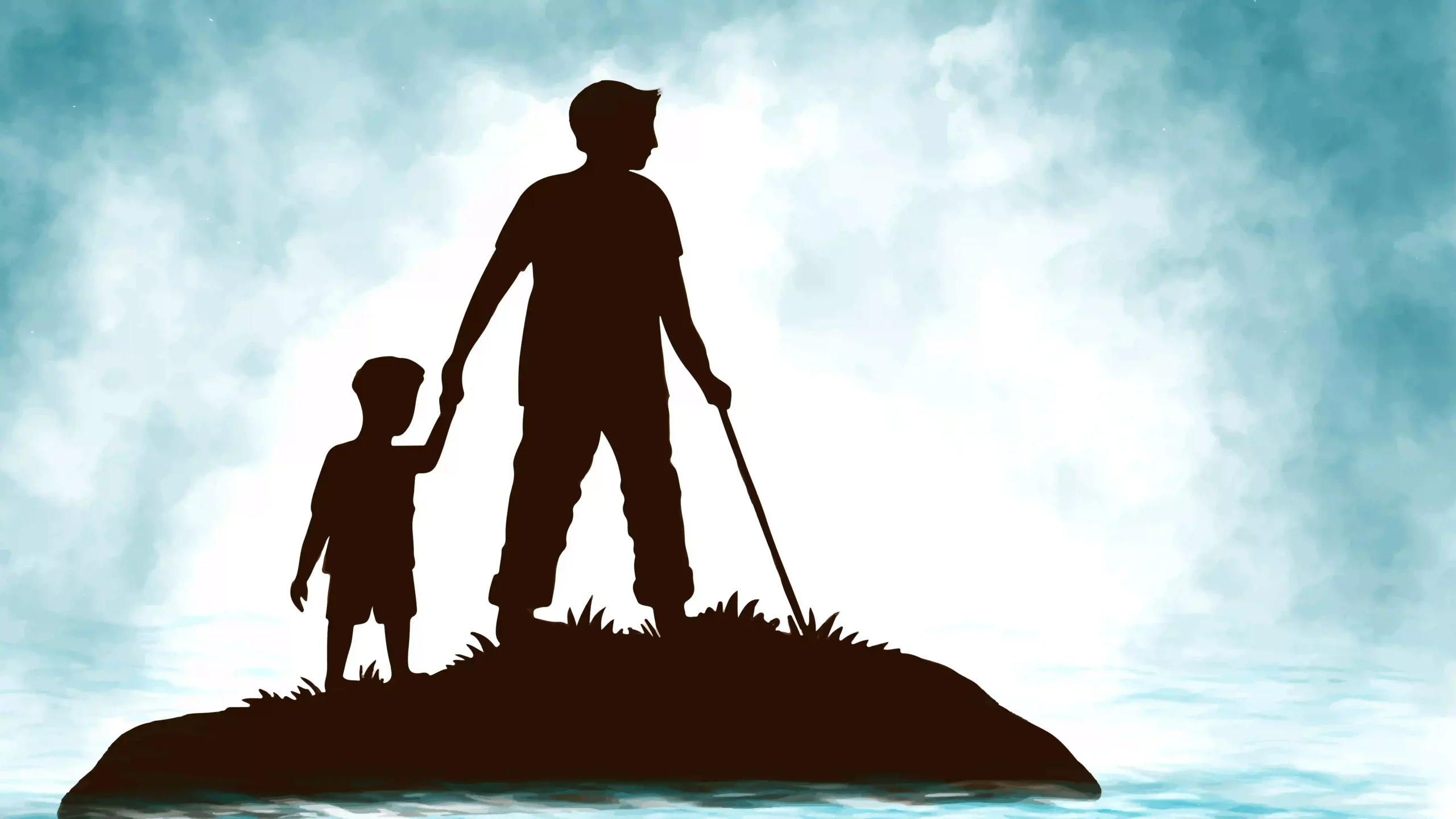The Road by Cormac McCarthy is one of those books that stays with you long after you turn the final page. Published in 2006, this powerful novel won the Pulitzer Prize for Fiction in 2007 and has become a modern classic. Set in a world destroyed by an unknown disaster, the story follows a father and his young son as they walk through the ruins of America, searching for safety and trying to survive.
What makes this book special is how it shows the strength of love between a parent and child, even when everything else has fallen apart. McCarthy’s simple but beautiful writing style has made The Road one of the most important books of the 21st century.
What is The Road About?
The Road takes place after some terrible event has destroyed most life on Earth. We never learn exactly what happened – it could have been a nuclear war, a meteor strike, or something else entirely. What we do know is that the world is now covered in ash, the sun is hidden behind dark clouds, and most plants and animals are dead.
In this scary new world, a man and his young boy are walking south toward the coast, hoping to find warmer weather and maybe other good people. They push a shopping cart filled with everything they own and search empty buildings for food. The biggest danger comes from other people who have turned to eating human flesh to survive. The father carries a gun with only two bullets – one for his son and one for himself, in case they get caught by the “bad guys”.
Even though the world has become a nightmare, the father and son keep believing they are the “good guys” who “carry the fire”. This fire represents their hope, their love for each other, and their refusal to give up their humanity.
Main Characters in The Road by Cormac McCarthy
The Man (The Father): The main character is never given a name – he’s simply called “the man” or “Papa” by his son. He’s a caring father who will do anything to protect his boy. Throughout their journey, he grows sicker and weaker, often coughing up blood. He remembers what the world was like before the disaster and struggles to teach his son right from wrong in a world where being good can get you killed.
The Boy (The Son): The child, also unnamed, was born after the disaster, so he’s never known a normal world. Despite all the horrors he’s seen, the boy remains kind and compassionate. He often wants to help other people they meet, even when his father thinks it’s dangerous. The boy serves as his father’s moral guide, reminding him to stay human.
The Mother (The Woman): Though she appears only in flashbacks and memories, the boy’s mother plays an important role in the story. She killed herself rather than face what she believed would be certain capture, rape, and death by cannibals. Her decision haunts the father throughout their journey.
Ely: The only character given a name (though it’s fake), Ely is an old man they meet on the road. He represents despair and believes the world would be better if everyone died. His dark philosophy contrasts sharply with the father and son’s determination to survive.
The Family at the End: At the story’s conclusion, the boy meets a man with a shotgun who has a wife and two children. This family represents hope for the future and the continuation of goodness in the world.
Summary of The Road by Cormac McCarthy
The story begins with the unnamed father and son traveling through the mountains in what appears to be the southeastern United States. They’re heading south because they know another winter in the cold mountains will kill them. The father is already sick – he coughs up blood and grows weaker each day, though he tries to hide this from his son.
Their world is a nightmare of ash and death. The sky is always dark, covered by clouds of soot from whatever destroyed civilization. No birds sing, no plants grow, and the few people left alive are either hiding like them or have formed gangs that hunt other humans for food. The father and son push a shopping cart containing all their possessions: some clothes, a tarp, a few tools, and their most precious items – canned food and a pistol with two bullets.
As they travel down empty roads, they constantly watch for danger. The father has taught his son to be quiet and hide when they hear vehicles or see smoke from fires. Their worst fear is being caught by the “roadagents” – groups of cannibals who keep prisoners to eat slowly. The father has promised his son that if they’re ever caught, he’ll use the gun to kill them both quickly rather than let them suffer.
Their journey is filled with close calls and discoveries. Early in their trip, they accidentally encounter a member of a cannibal gang. When the man grabs the boy, the father shoots him in the head, and they flee, abandoning most of their supplies. This event troubles the boy, who asks his father if they’re still the “good guys” after killing someone.
Later, while searching for food in a large farmhouse, they discover something horrible – a basement full of people being kept as living food by cannibals. Some prisoners have already had their legs cut off and eaten. The father and son run away just as the cannibals return home. This scene shows them how far humanity has fallen and how lucky they are to still be free.
Not all their discoveries are terrible. When they’re nearly starving, they find an abandoned apple orchard and a well with clean water. Even better, they later discover a hidden underground bunker filled with canned food, clean clothes, and supplies. For a few precious days, they can rest, bathe, cut their hair, and eat real meals. But they know they can’t stay – other people might find the bunker, and winter is coming.
Back on the road, they meet the old man called Ely. Against his father’s wishes, the boy insists they share their food with this stranger. Ely tells them dark things about the world, saying there’s no God and that humanity deserves to die. The father disagrees, believing that people like his son prove there’s still good in the world.
As they continue south, food becomes scarce again. They find an abandoned house with some supplies, but the father’s condition gets worse. When they finally reach the ocean, it’s not the paradise they’d hoped for – just more gray water under gray skies. They find a boat washed up on shore and the father swims out to get supplies from it, including a flare gun.
Their luck turns bad when someone steals their cart while they’re sleeping on the beach. They track down the thief – a desperate man traveling alone – and the father forces him to give back their things and strip naked. This upsets the boy, who says they can’t be good guys if they leave someone to die. The father returns later to leave the thief’s clothes, but the man is gone.
Moving inland through a dead town, disaster strikes when someone shoots the father in the leg with an arrow. The father kills his attacker with the flare gun, but the arrow wound becomes infected. As they struggle forward, the father knows he’s dying. He considers killing his son to spare him from being alone in this terrible world, but he can’t do it.
Finally, too weak to continue, the father stops by a stream in the woods. He tells his son that he must go on alone and keep carrying the fire – the goodness and hope that makes them different from the bad guys. When the boy asks if the fire is real, his father says it’s inside him and always has been.
After the father dies, the boy stays with his body for three days, talking to him and not knowing what to do. Then a man with a shotgun appears. The boy is frightened, but the man convinces him that he’s one of the good guys. The man has a wife, a son, and a daughter, and they’ve been watching the boy and his father, moved by their devotion to each other. The family takes the boy with them, giving him hope for a future where good people still exist.
The ending suggests that despite all the horror and death, humanity will continue through people who choose to remain good and care for each other. The boy, who learned from his father how to carry the fire, will help keep human decency alive in a broken world.
Major Themes in The Road by Cormac McCarthy
Survival vs. Humanity: The biggest theme in The Road is the struggle between staying alive and staying human. The father and son face the constant question: how far should you go to survive? While others turn to cannibalism, they refuse to abandon their morals. They remind themselves they’re “carrying the fire” – meaning they hold onto hope, love, and goodness even when it’s harder than giving up.
Love Between Father and Son: At its heart, The Road is about the powerful love between a parent and child. The father’s entire purpose is protecting his son, while the boy gives his father reason to keep going. Their relationship shows how love can survive even in the worst circumstances.
Hope in Hopelessness: Even though the world seems doomed, the story contains threads of hope. The boy represents the future – he’s kind, compassionate, and moral despite growing up in hell. His goodness suggests that humanity might rebuild itself on better foundations.
Memory and Loss: The father struggles with memories of the old world, including dreams of his dead wife. Sometimes these memories give him comfort, but they also make the present more painful. The theme explores how we deal with losing everything we once knew.
Good vs. Evil: The novel presents a clear divide between “good guys” who help others and “bad guys” who prey on the weak. However, it also shows how the line between good and evil can blur when survival is at stake.
Death and Mortality: Death surrounds the characters constantly – from the dying world to the father’s illness to the constant threat of violence. Yet the story shows that how we face death matters more than death itself.
Background
Cormac McCarthy was born Charles Joseph McCarthy Jr. on July 20, 1933, in Rhode Island, but grew up mainly in Tennessee. He became one of America’s greatest writers, known for novels like “Blood Meridian” and “No Country for Old Men”. McCarthy was famous for being very private and rarely giving interviews.
The idea for The Road came to McCarthy in the early 2000s while staying in a hotel with his young son. Looking out the window late at night, he imagined what the city might look like after a disaster – “fires up on the hill and everything being laid to waste”. This vision became the starting point for the novel.
Many of the conversations between the father and son in the book were based on real talks McCarthy had with his own child. This personal connection helps explain why the father-son relationship feels so real and touching.
McCarthy wrote The Road on his famous Olivetti typewriter (the same one he’d used for decades). He spent four years developing the story, expanding his original two-page idea into a full novel. The book was published in 2006 and immediately received critical acclaim.
The novel won the 2007 Pulitzer Prize for Fiction, one of literature’s highest honors. It was also made into a movie in 2009, starring Viggo Mortensen as the father. Oprah Winfrey selected it for her book club, leading to McCarthy’s rare television interview.
Despite winning major awards, The Road divided readers. While many called it a masterpiece, others found it too depressing or criticized McCarthy’s spare writing style. This split reaction is common with McCarthy’s work – his books often challenge readers with difficult subjects and unique approaches to storytelling.
Frequently Asked Questions
Q: What caused the apocalypse in The Road?
A: McCarthy never explains what destroyed the world. It could have been nuclear war, a meteor impact, volcanic eruption, or something else entirely. This mystery is intentional – the cause matters less than how people respond to the disaster.
Q: How old is the boy in the story?
A: The boy’s exact age isn’t given, but most readers guess he’s between 6 and 10 years old. He was born after the disaster and has never known the normal world.
Q: Are the father and son’s names ever revealed?
A: No, they remain unnamed throughout the entire book. This makes them universal figures representing all parents and children facing hardship.
Q: What does “carrying the fire” mean?
A: “Carrying the fire” represents keeping hope, goodness, and humanity alive in a dark world. It means refusing to become like the “bad guys” even when it’s harder to stay good.
Q: Is the ending hopeful or sad?
A: The ending is bittersweet. While the father dies, the boy finds a new family who will care for him. This suggests that good people still exist and humanity will continue.
Q: Why don’t any characters have names?
A: McCarthy’s choice to avoid names makes the characters universal symbols rather than specific individuals. This technique helps readers connect more deeply with their struggles.
Q: Is The Road appropriate for young readers?
A: The book contains disturbing scenes of violence and cannibalism, so it’s best suited for mature readers who can handle difficult themes.
Conclusion
The Road by Cormac McCarthy stands as one of the most powerful novels of the 21st century. Through the journey of an unnamed father and son across a destroyed America, McCarthy explores what it means to be human when everything else has been stripped away. The book’s strength lies not in its post-apocalyptic setting, but in its deep examination of love, hope, and moral choice.
What makes The Road unforgettable is how it finds light in the darkest places. Even as the world dies around them, the father and son hold onto their humanity through small acts of kindness and their unshakeable love for each other. The boy’s goodness shines like a beacon, suggesting that no matter how far humanity falls, there will always be people willing to “carry the fire”.
McCarthy’s spare, beautiful prose brings this harsh world to life without unnecessary decoration. Every word serves a purpose, creating a reading experience that’s both brutal and deeply moving. The book challenges us to think about what we would do in similar circumstances and what values we’d fight to preserve.
While The Road can be difficult to read due to its dark subject matter, it ultimately affirms the power of human connection and hope. In a world where everything has been lost, the love between a father and son becomes the most precious thing of all. This timeless message ensures that The Road will continue touching readers for generations to come.




